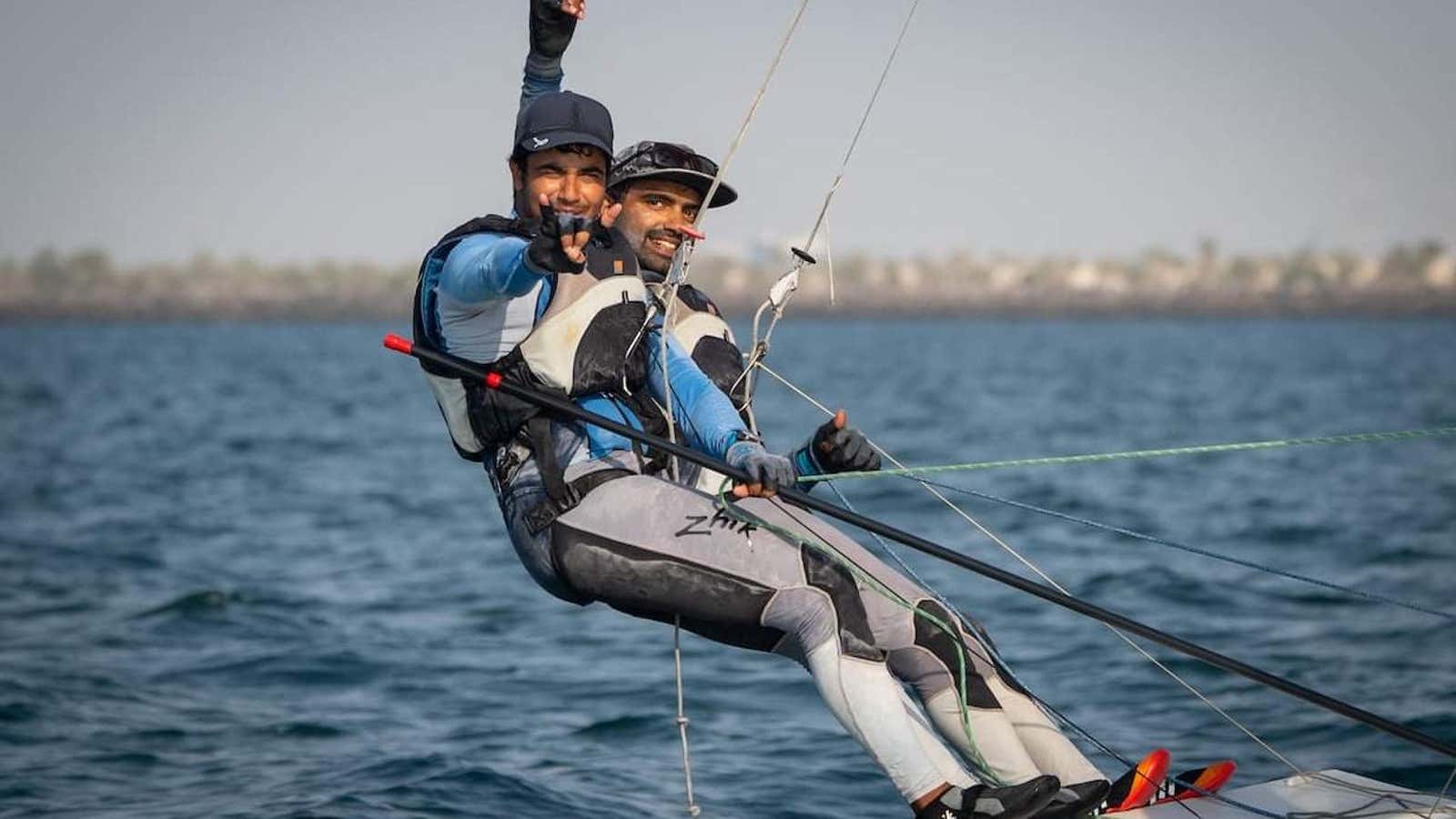In the last week of May, KC Ganapathy and Varun Thakkar were quarantining in a hotel room in Portugal. For the next two months, this European country is the training ground—or sea, rather—for the Indian Olympians.
But the road to the coveted Tokyo games has been a long and challenging one. As they train out on the water for six to eight hours each day, they’ve been reflecting on a year of home gym sessions and unfortunate injuries.
The early years
The duo, now in their mid-20s, started sailing early in their childhood. “I absolutely loved it. Taking your own boat to sea, coming down waves in storms, seeing dolphins and lightning, it was exhilarating,” Ganapathy reminisced. In their teenage years, they trained at the same club in south India—the Tamil Nadu Sailing Association (TNSA). Every Sunday, roughly 15 kids would race their boats. Later, they would all play cricket and hide-and-seek.
The classes weren’t cheap, costing tens of thousands of rupees each month, but Ganapathy and Thakkar were fortunate enough to have parents who could comfortably foot the bills.
They were coached by “Munna Uncle,” as Ganapathy fondly refers to TNSA founding member Munna Jamal. For two decades, since TNSA was founded in 2002, Jamal has shaped many sailing careers in the country. He has also trained Nethra Kumanan, who became the first ever Indian woman sailor to qualify for the Olympics this year.
By the time Ganapathy and Thakkar turned 15, their schools were just not giving them enough time off for training. They quit the traditional schooling system, choosing instead to be home-schooled. They dedicated more time to sailing, and eventually started participating in and winning international competitions.
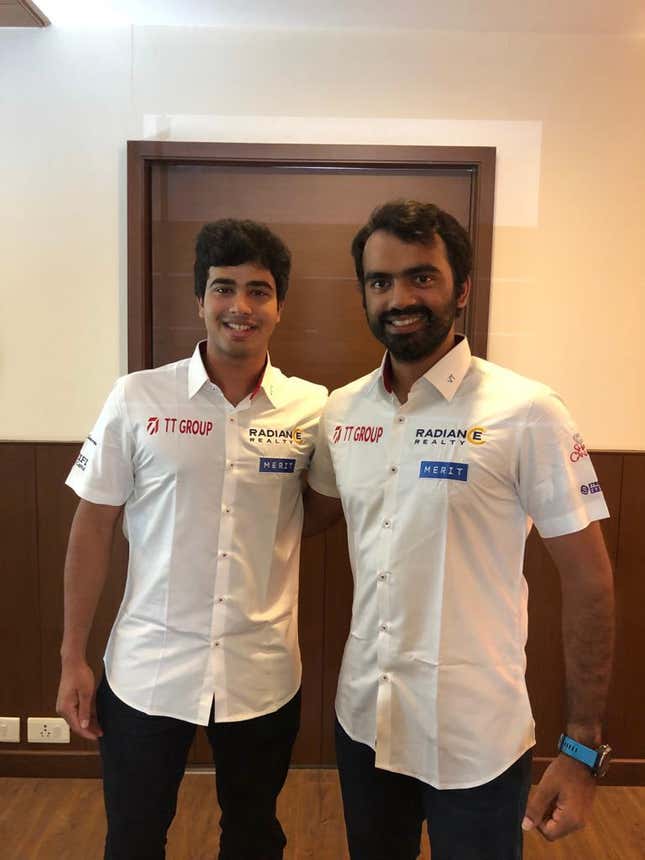
After training and competing separately at first, in 2011 they started sailing together on the 29er—a 4.4 meter (14.4 ft), two-person, single-trapeze dinghy with an asymmetric spinnaker and a lightweight hull. In 2014, they jumped to the bigger, Olympic class 4.995 m (16.4 ft) 49er.
When the pandemic hit last March, training came to a standstill for months. But even after India’s 10-week lockdown lifted in June 2020, their woes did not end. From a broken foot to falling off the boat in a qualifying race, the duo went through the grinder before bagging their spot at the Tokyo games.
And despite the years of preparation, the jump to the Olympics still feels daunting.
“In under-18 [sailing], the guys winning every year are 18. They grow old and they leave. In the Olympic class, there’s a saturation of talent,” said Ganapathy. “The guys are there for 15-20 years. You just can’t jump into it and start winning.”
Sailing into the Tokyo games
For the two sailors, although the coronavirus outbrea cost them a lot of on-water training time, it helped in another way.
Compared to the 120-140 kilograms crew weight for their previous boat, they now needed to weight between 145-165 kgs. They missed out on the 2016 games in Rio because they were too light for the boat. In 2018, they clinched the bronze medal at the Asian games despite being disqualified in the penultimate race. But before the qualification event in 2020—which got postponed owing to the pandemic—they were still 7-8 kgs too light. They now had time to put on some weight.
“We were training in our home gym, doing whatever we could do with our trainer,” Thakkar told Quartz.
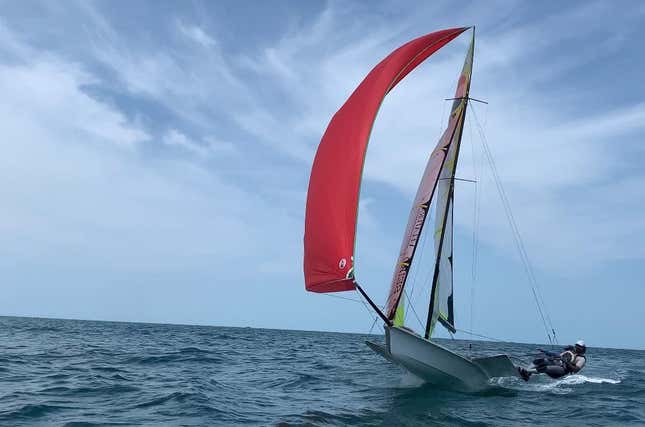
In August 2020, they finally resumed training on the water at Rameshwaram, 600 kilometers (370 miles) south of Chennai. But just when things were looking up, “like an idiot, I fell off my motorcycle,” Ganapathy said. He broke his foot, and training had to be put on hold again for three months. In December, they finally started training intensely for a qualification event in February in Abu Dhabi.
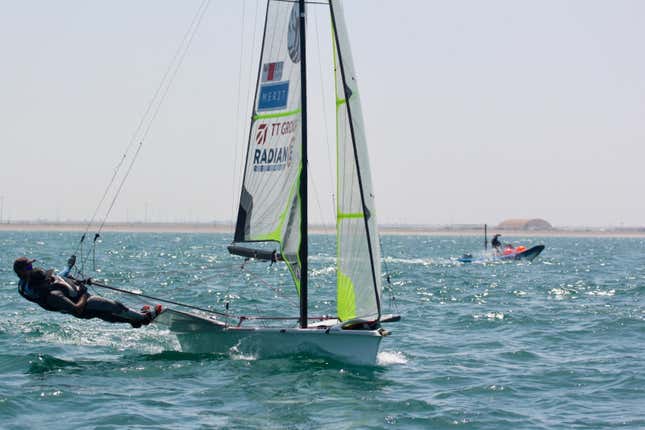
Funded by private sponsors, they made it to Abu Dhabi in February, quarantined in a hotel, and began practicing—but then the event was called off and rescheduled for Apr 1-8 in nearby Oman. They had to move again, and faced the challenge of getting not just their own but the entire Indian contingent’s precious sailing equipment into yet another country. In late March, their boats were still in Abu Dhabi.
Amid all the frenzy, there was still a question mark over who would coach them.
A new coach
In Oman, they hired coveted Australian coach Ian Stuart Warren to guide them during the qualifiers, with their parents picking up the tab. (Warren had previously quit training the Indian sailing team just ahead of the 2018 Asian games over alleged contractual discrepancies.)
When the 15-race event began, the pressure was on. It had been some time since Thakkar and Ganapathy’s last race in November 2019 and they had a shaky start. “The first day was super choppy conditions. We were lacking that speed a tiny bit,” Ganapathy says. But as the event went on, they made adjustments and climbed the leaderboard.
In the final race, “it was either us or Hong Kong. The rest were too far behind. And I fell off the boat in the race. It was looking really bad for us,” Ganapathy recalls. But they still managed to win.
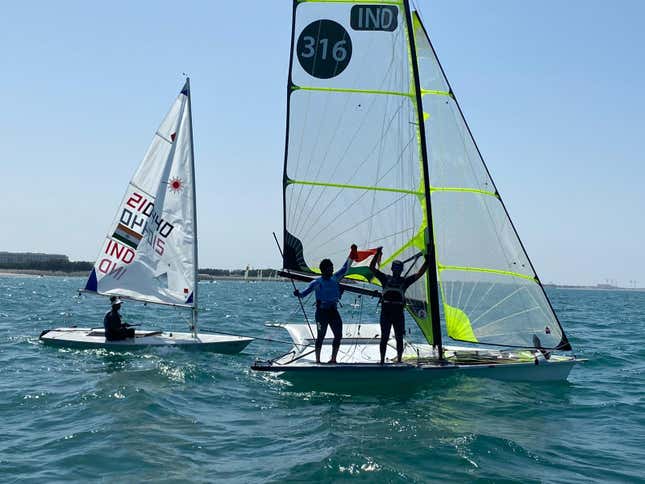
The sailors credit Warren with saving their sailing career. “We put in three years in the 49er and it was going nowhere before he came in [the first time around] in 2017,” Ganapathy said. “The technical input, the work ethic, and the attention to detail from his side is phenomenal. So we brought him back and we had seven days of training in Oman.”
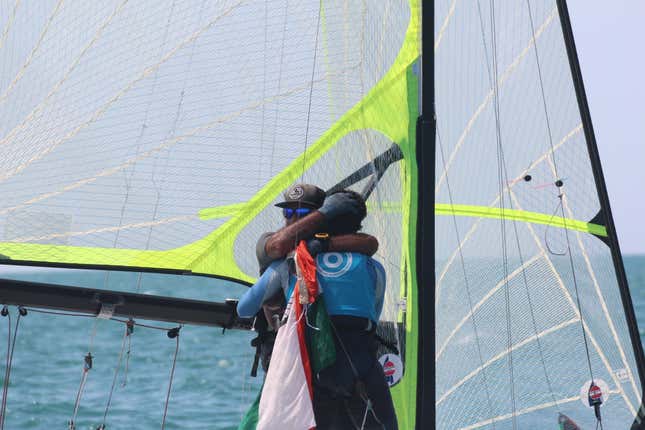
Thakkar and Ganapathy are the fifth team that Warren has sent to the Olympics. But whether he will be by their side in Tokyo is still up in the air.
From Portugal to Japan
In a historic achievement, for the first time four Indians will compete at Olympic sailing events. Besides Thakkar and Ganapathy, Kumanan and Vishnu Saravanan have also qualified.
They will stay in Portugal, which is known for its big waves and lots of wind—conditions similar to those in Japan—until mid-July, when they depart for Tokyo.
“In football, the pitch and goals are all the same size. With sailing, the waves are different, the tides are different, there are different temperatures, the wind is different,” said Ganapathy. “You need to learn the difference from venue to venue.”
The athletes are hoping they can travel directly from Europe to Japan because returning to India, where another Covid-19 wave appears imminent, seems unsafe. In Tokyo, they trust Olympic organizers to create secure bubbles.
Meanwhile, they continue to look ahead.”The goal is to keep the 2024 medal in our mind,” Thakkar says. If they don’t win in Japan, there will be no regrets, according to Ganapathy: “We always say a bad day on the water is better than a good day in the office.”
